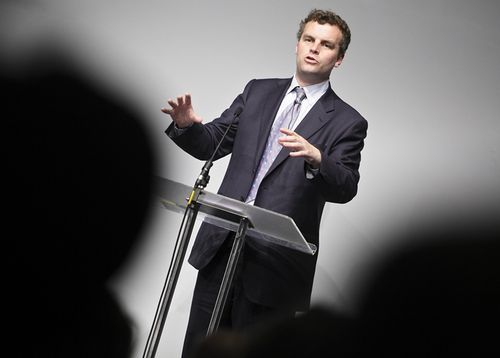 The FT Magazine has a cover boy today: Tim Montgomerie. It’s about how “a small group of Christian Conservatives are rewriting party doctrine,” and has positioned Tim in such a way that there appears to be a halo behind his head with his eyes heavenwards. Something tells me this was not the picture Tim was expecting. The front cover tease sounds like one of these conspiracy theories you get in America: the capture of a political party by a small band of idealogues etc etc. Read on, and the piece is fair and instructive: it tells the important – but hardly controversial – part of a key aspect of Conservative development. It starts in 1990, when Tim founded Conservative Christian Fellowship, on principles which went on to guide his career. Such principles informed Iain Duncan Smith’s Centre for Social Justice – which, of course, is now perhaps the single most influential think-tank on Tory policy.
The FT Magazine has a cover boy today: Tim Montgomerie. It’s about how “a small group of Christian Conservatives are rewriting party doctrine,” and has positioned Tim in such a way that there appears to be a halo behind his head with his eyes heavenwards. Something tells me this was not the picture Tim was expecting. The front cover tease sounds like one of these conspiracy theories you get in America: the capture of a political party by a small band of idealogues etc etc. Read on, and the piece is fair and instructive: it tells the important – but hardly controversial – part of a key aspect of Conservative development. It starts in 1990, when Tim founded Conservative Christian Fellowship, on principles which went on to guide his career. Such principles informed Iain Duncan Smith’s Centre for Social Justice – which, of course, is now perhaps the single most influential think-tank on Tory policy.
So, how “Christian” is all this? The CSJ is about concern for the poor, about the basic duty to look at politics in terms of what it can do for the least advantaged. Such values may be the bedrock of Christianity but are hardly exclusive to it. As Chris Cook says: Jonathan Sacks, the Chief Rabbi, helped Tim line up funding. Anyone concerned about how UK welfare policies were incubating, rather than eradicating, poverty joined in too. The Tory Social Justice movement may have had its genesis in Christianity, but the CSJ is devoted to far wider cause of understanding and fighting poverty. Other aspects which worry the critics of Christianity – concern about homosexuality, women’s rights, abortion etc – cannot be found anywhere in the CSJ (as Tim says in the wee video interview he recorded for the FT piece). It’s about poverty, not Christianity, and is Christian only insofar as it’s about the key message of the Bible: duty to the disadvantaged.
The CSJ armed Cameron with a competing analysis to that of Labour’s – and an analysis that had not come from asking “how can we revive our poll ratings” but “how can we heal the broken society”. It was about an agenda, not party politics. Even now, it’s hard to see distinctly Christian influence in the Cameron project. Very few of the top team are regular attendees at either church (or synagogue). The emphasis on marriage is inspired by a raft of sociological research proving that the family is, empirically, the first best and cheapest source of health, wealth and education. It may be that Christians are drawn towards the CSJ agenda – but so are Jews, Muslims, humanists, and anyone who wants a different approach to tackling the urgent scandal of British poverty.
I have the feeling that Chris Cook’s FT piece started off as one about Christianity in the Conservative party – but ended up focusing so much on Tim because there just isn’t enough material to sustain a narrative about a Christian takeover of (or even discernable influence on) the Cameroons. This isn’t to say they are unChristian. Just that the values that Tim has fought for have a universal appeal: and that his dedication in advancing that agenda, at a time when the pilot light of Conservatism was flickering, has furnished Cameron with one of the most exciting and radical parts of his agenda.







Comments